South Korea. A Change of Pace.
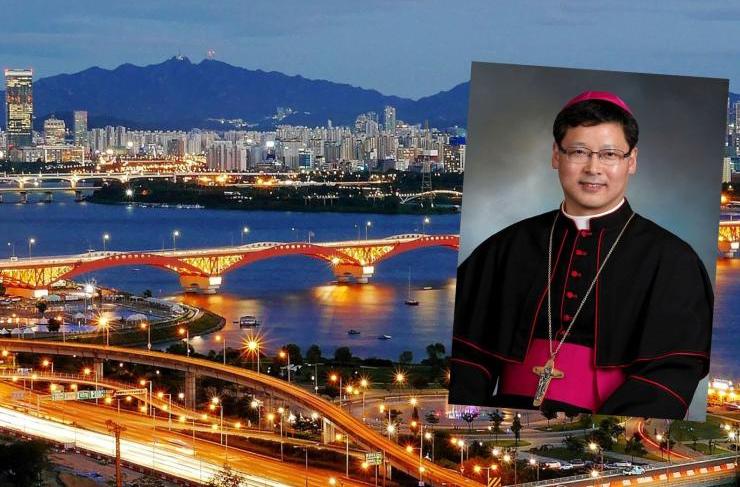
An outgoing church that experiences the presence of the Holy Spirit. The synodal journey of the ecclesial community. The challenge of young people. The desire for reconciliation with North Korea.
It is perhaps the metropolis of Asia on which the spotlight has focused most in recent years. From the rhythms of K-pop to the success of the Seoul TV series that broke into homes around the world. Including the contradictions of this metropolis of 10 million inhabitants, which the death of 158 young people in the Halloween crowd last October was a symbol. Also for the Church, South Korea has long been a significant place: for years it was the Catholic community of records, the one that was growing at a rate unimaginable in other areas of the world.
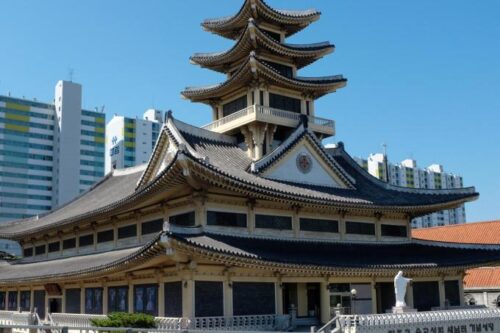
The Saenamteo Martyrs’ Shrine. CC BY-SA 2.0/ Craig Rohn
And even today when its faithful have settled at around 11.3% of the population, the Korean Church remains a vital reality, which gives the rest of Asia missionaries, and precious support. Yet, even in Seoul, the Christian presence feels the need for a change of pace. Above all, Monsignor Peter Chung Soon-taick, Archbishop of Seoul since December 2021, is convinced of this. “As Pope Francis says, we must be an outgoing church. We cannot wait for people in our churches. We must get close and accompany them”. Peter Chung Soon-taick was born in Daegu in 1961. He studied engineering before entering religious life in the Discalced Carmelite order. A priest since 1992 and a biblical scholar, he was a member of the general curia of his order before being appointed auxiliary bishop of Seoul at the age of 52 alongside Cardinal Andrew Yeom Soo-Jung.
A strong Catholic presence
Speaking of the priorities of the church in Seoul he says: “First of all, we must take care of the spiritual well-being of our Christian communities. During this pandemic when we have relied on our faith and spirituality as never before, we must continue to offer everyone the opportunity to take time to examine our experience of ‘living in the Spirit’. I firmly believe that spirituality should be the heart of the Church. Through these efforts to deepen our relationship with God, we will be able to explore together how the Church can play a vital role in contemporary society. Secondly, as the Pope wrote in the Apostolic Exhortation ‘Christus Vivit’, to welcome and walk with young people who are protagonists of the future, especially those who are exhausted and who struggle with so many issues. Thirdly, I hope and strive to make the Seoul Archdiocese renewed and transformed through this synodal process. The day following my appointment as Archbishop, I asked the faithful to define a Church that lives the Synod in the presence of the Holy Spirit and to journey together. In the synodal journey of the ecclesial community, I want to commit myself to making the Church the salt of the earth, the light of the world, listening to the voice of the Holy Spirit and sharing her love with others in communion with God”.

The Archdiocese of Seoul has 232 parishes, with 1.5 million Catholics, about 15% of the total population.
The Catholic Church has a strong presence in Korean society. Out of a population of about 10 million inhabitants, the archdiocese of Seoul has 232 parishes, with 1.5 million Catholics, about 15% of the total population. There are 945 priests and 186 seminarians. Within 32 male religious institutes active and present in the area, there are 500 members, while for the religious women, about 2,100 nuns work in 75 female congregations. In 2019 we baptized around 17,000 children and adults. The Church is strongly committed to social works that witness our faith in Christ: with 34 kindergartens, 12 middle and high schools and 2 universities. As well as the service that is also carried out in hospitals and in ten social centres that promote works of charity for the marginalized, the poor and the excluded, there are five cultural centres and the Church has a committed presence in the field of mass media.
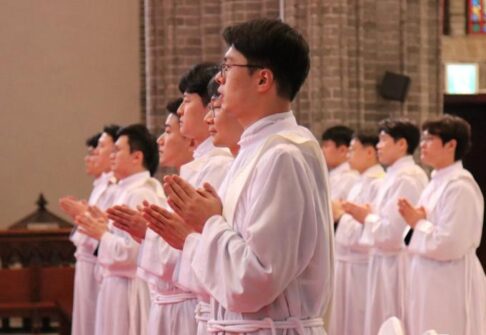
On Friday, February 3, the Archdiocese of Seoul ordained 24 new priests and 20 new deacons.
Referring to the main challenge facing the Church, the archbishop of Seoul pointed out: “Today, South Korea is certainly a materialistic society with an extremely performance-oriented culture which suffers from a lack of ethics, standards, and respect for human dignity. The 70-year-long division between North and South Korea has caused political conflicts and turned them into enemies. Also, the COVID-19 pandemic has further amplified social discrimination and inequality, while spiritual and evangelistic activities have been greatly reduced within the Church. Last but not least, we must recognize and address the serious problem that all dioceses around the world have in common; lapsed Catholics make up the second-largest religious body while young people leave the Church as young adults. Therefore, a priority has been identified for young people, to be recipients of special programs of evangelization and youth ministry which the religious are called to carry out”.
Uniting the youth around a project
On the day of his inauguration as archbishop of Seoul, he wanted to be accompanied by a group of young people. Archbishop Peter Chung Soon-taick says: “We need a turning point for our youth ministry. This is why we want to bring World Youth Day to Seoul in 2027. We are presenting our candidacy to be the diocese that will host the world gathering with the Pope in the edition following this year’s event in Lisbon. The other bishops of Korea have also given their support. Nothing is decided yet, but we are preparing the dossier
to be sent to the Holy See”.
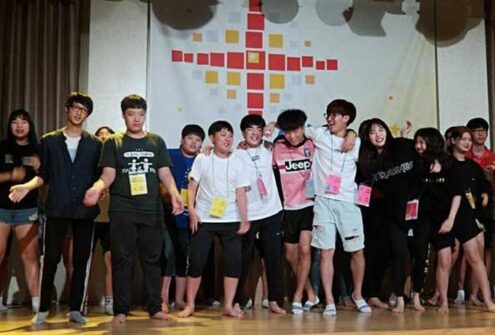
“We want to bring World Youth Day to Seoul in 2027”.
Hosting a WYD in Seoul would be “an event that would not begin and end in the space of a couple of days: it is a journey. Its preparation could become an excellent opportunity to bring young people together around a project, making them protagonists. And even once it is finished, it would be nice to share what we have experienced with everyone: it would become a missionary opportunity to make the values of the Gospel known in our society”.
North Korea. Opening doors
As Archbishop of Seoul, Msgr. Peter Chung Soon-taick is also the Apostolic Administrator of Pyongyang, where the Catholic Church has been eliminated since the rise of the communist regime. Looking at the current situation, he says with regret: “Since the Singapore summit between then US President Donald Trump and North Korea’s Kim Jong-un failed three years ago, Pyongyang has severed relations with all countries and especially with South Korea. Previously there had been some contact: we too as a Church were able to send aid.”
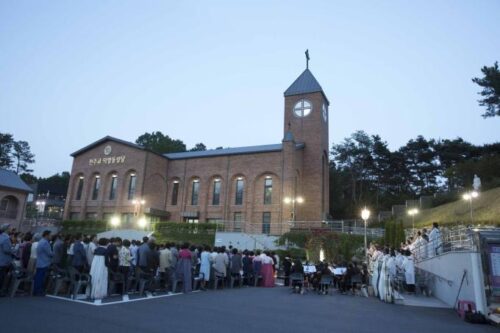
“ We must take care of the spiritual well-being of our Christian communities”.
“Now everything is blocked; we have no access”. As the apostolic administrator of Pyongyang reminds me, “I can do practically nothing. But if any possibility arises, I will do my best to reopen the doors. I also hope to be able to help Pope Francis visit North Korea. He has repeated many times that he would like to go there. And even Pyongyang has said that they would welcome it. They are two parties that say the same thing: they just have to meet”. The war in Ukraine has recently seen heightened tensions and missile tests in Pyongyang. “We have to think creatively – says the Archbishop of Seoul – to bring North Korea back to open its doors. Some bishops in South Korea have serious doubts about the sanctions that the United States and other countries have imposed on Pyongyang for many years. They made people’s lives more difficult, without preventing the government from continuing to arm itself. Another way has to be found. If we stopped looking at them as enemies what would happen? Wouldn’t they change too”?
Archbishop Peter Chung Soon-taick concludes: “The war has never ended; only a ceasefire has been in force for seventy years. But we desperately need reconciliation. We are the same people, the same nation, we have the same history. As Archdiocese of Seoul, we keep this question alive: we have a special committee for peace and reconciliation which has the task of exploring every way to connect, communicate with, and help the North”. (Open Photo. The Han River at sunrise. CC BY-SA 4.0/Brit – Monsignor Peter Chung Soon-taick, Archbishop of Seoul)
Giorgio Bernardelli/MM



